- Skip to content
- Skip to navigation


Our festival
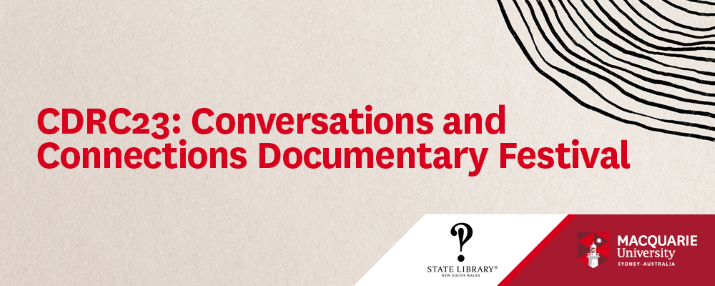
28 November – 1 December, 2023
Location: State Library of New South Wales
Be inspired when Macquarie University’s Creative Documentary Research Centre (CDRC) brings together doco-makers and industry professionals, academics and the public to explore the power of today’s creative documentary forms.
Held over four days from Tuesday 28 November to Friday 1 December, at the State Library of New South Wales, you will have the opportunity to engage in a comprehensive program of screenings, workshops, and panels designed to consider challenging contemporary ideas. These include: documenting Australian natural history during this time of climate crisis, conducting oral history and documentary histories, and the art of documentary practice itself.
So, join any one of these twenty-plus conversations and connect with a community of creative minds passionate about the documentary arts.
See more detailed program information .
Day 1: Tuesday 28 November
Creative documentary: strengths and challenges, session 1: 10am – 12.30pm, postgraduate creative documentary community and screen challenge.
The CDRC invites post-graduate scholars to a workshop designed to strengthen the research community of higher-degree documentary-based practitioners. This workshop will have two components:
- an introduction to the CDRC and the broader community of documentary-based post-graduate scholars
- a documentary-making challenge that employs selected images from the State Library of NSW photo archives in a Post Graduate Screen Challenge (competition details and prizes described on the day, with winners announced on the closing night, Friday, December 1, at the Black Snapper Festival Awards).
Attendance for this session is by invitation only.
Session 2: 12.30pm – 1.15pm
Black snapper presents: lunchtime micro screenings.
A series of curated screenings from the Black Snapper International Film Festival.
Register here
Session 3: 1.15pm – 3.45pm
Creative documentary futures forum.
This CDRC-chaired forum will bring together diverse expertise from the documentary industry to inquire into creativity in the sector, asking: How do we maintain and expand creativity in documentary?
The forum brings a range of perspectives to the table, with speakers spanning the domains of academia, the GLAM sector, festivals, filmmakers and government. The forum will conclude with a discussion designed to develop recommendations to sector stakeholders and government on building a more diverse and creative documentary sector.
Session 4: 4.15pm – 6.15pm
Black snapper presents: best documentary screenings, session 5: 6.30pm – 8.30pm, screenings with the filmmakers: the skin of others directed by tom murray.
Indigenous historian Professor John Maynard and CDRC Director Professor Tom Murray present Murray's award-winning film The Skin of Others . This documentary explores the remarkable life of Indigenous activist and World War I veteran Douglas Grant. Featuring the late great artist-performers Balang T.E Lewis ( The Chant of Jimmie Blacksmith ) and Uncle Archie Roach, this portrayal of Douglas Grant offers a poignant and timely insight into the challenges facing Indigenous activists and the ongoing battle for truth-telling and open-hearted reflection on the legacy of colonialism in Australia.
Day 2: Wednesday 29 November
Stories and histories, collecting oral history workshop.
In this session, leading oral and public historians discuss the practices, challenges and solutions involved in collecting oral history. The session will be followed by a practical workshop designed to develop and expand oral history collection skills that will be of benefit to anyone interested in the craft and practice of oral history.
Register here .
Session 3: 1.15pm – 2.45pm
What is self-narrative text and beyond.
This session takes a multi-disciplinary approach to the task of self-narration across the expressive domains of writing, drawing, photography and dance/performance. Thinking through the capacities of various media to communicate to others the lived and embodied experience of self, this panel will offer thought-provoking insights drawn from diverse narrative practices.
Session 4: 3.00pm – 4.30pm
Indigenising the historical narrative.
In this panel leading Indigenous storytellers explain their unique approaches to documenting the histories and cultures of this continent now called Australia. From a First Nations perspective the panel will unpack and describe some of the ways in which Indigenous approaches to the past challenge colonial methods and narratives of Australian history. It will also offer insights into contemporary truth-telling and to Indigenous narrative practices that long predate colonial occupation.
Session 5: 4.45pm – 6.15pm
History on screen.
Leading history practitioners and scholars on this panel will describe what is unique to history-telling on screen. How does history told in a screen documentary form differ from traditional (written) text-based history works – and what do these differences tell us about both screen history and about history-telling more generally? A fascinating conversation about the potential and inherent challenges to screen history-telling.
Session 6: 6.30pm – 8.30pm
Screenings with the filmmakers: ablaze directed by alec morgan and tiriki onus.
Award winning director and CDRC member Dr Alec Morgan presents his acclaimed documentary Ablaze (directed by Tiriki Onus and Alec Morgan) about the life of entrepreneur, impresario, entertainer, filmmaker and activist Bill Onus. Told through the investigative journey of Bill’s grandson, the opera singer, performer, writer and scholar Tiriki Onus, this is a compelling untold story of activism, resistance and politically driven art-making. It is also a disturbing tale of state surveillance and intimidation, and a remarkable film about the passionate and inspiring life of Bill Onus, Australia’s first Aboriginal filmmaker.
Day 3: Thursday 30 November
Culture, nature and climate crisis, drawing the world: drawing to discover workshop.
Drawing is an ancient and powerful form of documentary-making. From the cave paintings of France, Arnhem Land or Sulawesi to the work of artists, architects and scholars today, humans have been drawing and making sense of their environments for at least 45,000 years. Through the personal practices of our esteemed panelists we will hear how drawing has formed an indispensable part of their sense and world-making and has subsequently informed their art and their knowledge of the world.
Virtual reality documentary
Virtual reality and 360-degree imaging is transforming the ways we can engage, understand and express our relationships to-, with- and in- the world. In this session, leading VR practitioners and thinkers offer insights into their cutting-edge practices, and describe some of the risks, challenges and benefits of working in this exciting new 360-degree medium.
Nature documentary in the age of climate crisis
In this panel two of Australia’s leading natural history and nature documentary practitioners, Jen Peedom and Nick Robinson, discuss their body of screen-works. What makes for a great nature documentary, and how do these filmmakers address the most urgent environmental issue of today? Sharing their experiences of documenting ecosystems subject to rapid climate change, this panel reflects on the role of documentary in this age of climate crisis.
Session 5: 4.45pm – 6.30pm
Screenings with the filmmakers: mountain directed by jennifer peedom.
Screening of Jennifer Peedom's documentary Mountain , the highest grossing Australian documentary in box office history. Peedom and the Australian Chamber Orchestra join forces in a cinematic and musical collaboration that delves into humanity's enduring fascination with elevated landscapes. The film is sparingly narrated by Willem Dafoe.
Session 6: 6.45pm – 8.30pm
Screenings with the filmmakers: australia’s ocean odyssey directed by nick robinson (cultural screening).
This documentary reveals the marine arteries and veins of planet Earth – a life support system that has helped regulate the Earth's climate, atmosphere and biological diversity for millions of years. Following the East Australian Current from the Great Barrier Reef south to Tasmania, we witness how these planetary systems impact and transform the living systems we all rely upon.
Day 4: Friday 1 December
Families, fakes and documentary forms, storytelling on the ground workshop.
This panel and workshop offers a multi-disciplinary approach to documenting communities and families. What are the unique challenges and benefits of documenting families and communities, including your own? In this panel and workshop leading screen storytellers and scholars explain their own personal commitments and experiences working in this area, and offer some hands-on exercises designed to build skills in this fascinating documentary field.
The world of deepfakes is fast evolving, anxiety provoking and offers fascinating capacities to disrupt current documentary practices. In this session, award-winning screen-makers describe how and why they are applying this new technology to their screen narratives. Scholarly experts in the field of media and ethics discuss how deepfake media interventions challenge notions of documentary authenticity, evidence and reality. In an era awash with misinformation, deepfakes are providing a challenge to audiences and media-makers alike.
Documentary as experiment and speculation
For documentary-makers some areas will always be inaccessible to cameras and data-collecting devices. But it doesn’t mean they are forever unknowable. What happens if we set up an experiment to find out what happens in a jury room, or we use actors to investigate and speculate on the lives and events of the past? In this session we meet filmmakers and scholars doing exactly this: experimenting and speculating in order to determine what happens behind closed doors today, what may once have been … and what might yet happen.
Black Snapper presents: Best of fest screenings
Black snapper awards ceremony.
The Black Snapper International Film Festival awards ceremony honours some of the best screen and audio works being made by students throughout Australia and the world. With over 1000 submissions from over 75 countries, this is Australia's largest student screen awards event with categories covering screen and audio fiction and documentary, animation, and with Special Jury prizes for innovation/experimentation and for environmental/social awareness raising. This is the culminating gala event of the two-weeks long Black Snapper International Film Festival. Learn more about the Black Snapper gala .
Meet Tom Murray of the Creative Documentary Research Centre
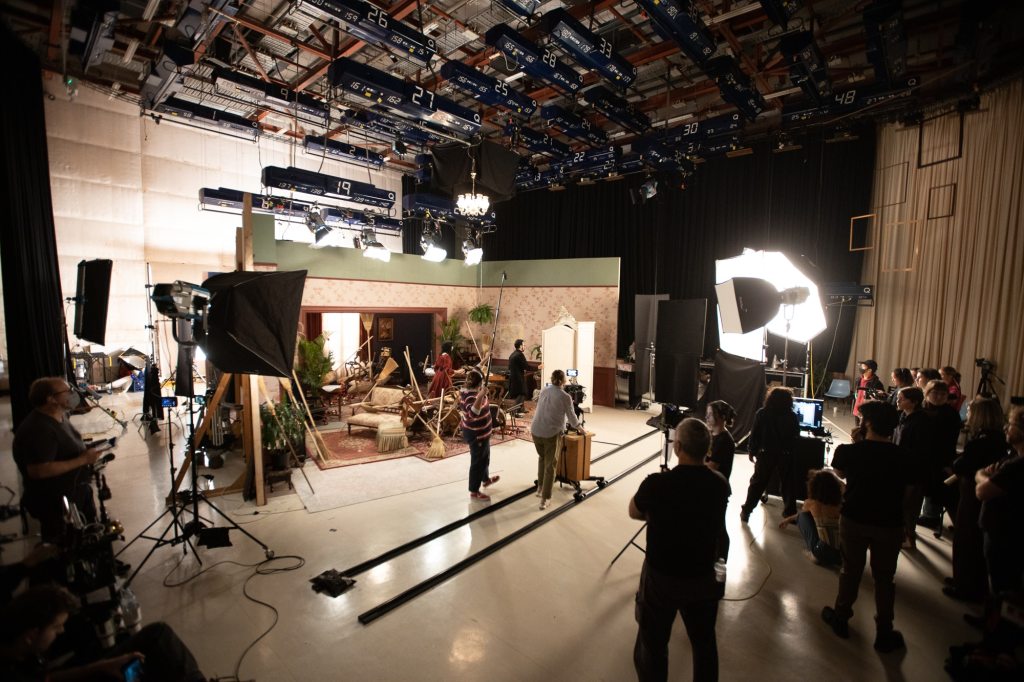
Cast and Crew of ‘BreakingPlates’ shooting in 10HA Screen Studio, Macquarie University May 2022 photo by Gary Compton (c) The Physical TV Company[67]
The arts sector has suffered a substantial decrease in funding over the last decade, which has been exacerbated more recently throughout the COVID-19 pandemic. With limited sector funding, Australian universities are thinking more about how to provide creative artists with a pathway to practice their work, and ensure the continuation of creative arts outputs within the community.
As a direct response to this, Macquarie University last year launched the Creative Documentary Research Centre (CDRC) within the Faculty of Arts, which intends to support the creative productions of its members and students across all documentary media (screen, audio, photography, digital media and forms of writing).
Since its establishment, the CDRC has had two films show on ABC TV ( Ablaze and Dhakiyarr vs the King ), and three on SBS TV ( I Want To Make a Film About Women , This Is Our School and The Skin of Others ), which continue to be recognised with a range of nominations and awards.
ScreenHub sat down with Associate Professor Tom Murray, the founding director of the CDRC, to talk about the impact of the centre so far and where it plans to go in the future.
The CDRC was created as a vehicle to promote documentary-based research within the tertiary sector and beyond. We are hoping to fill a gap in the Australian creative arts sector that has opened up as the successive federal and state governments have reduced funding over the last decade.
It has become progressively more difficult to make long-form, investigative, immersive, thoughtful, poetic and innovative creative-arts and documentary-based work. And the lack of funding in this area has diminished us as a culture, and as a nation. We are now less able to reflect on where we have been – and less able to imagine where we are likely to go.
So, with the CDRC, we hope to offer an opportunity to support documentary-based work by young, innovative and diverse creative thinkers. At the CDRC, we provide an intellectual and creative environment that encourages deep, reflective, poetic and innovative work that can extend the national discourse, and develop creative scholars and creative arts-makers for the future.
We have world-class facilities and technical support, and have the capacity to create high production-value work, and excellent post-production including studios, edit suites, colour grading, and audio mixing suites.
The CDRC and its members currently have five films on broadcast television, including Ablaze , and Dhakiyarr vs the King on ABC TV, and I want to make a film about women , This is our School and The Skin of Others on SBS TV. All of these films (except Dhakiyarr vs the King ) were made using studios, equipment and technical support from the CDRC, and were enriched by the community of scholars and peers who gave advice and support during the long gestation of these works.
The CDRC advocates for an expanded concept of ‘documentary’ that includes writing in all of its forms, and we have members such as Kate Rossmanith whose works include Small Wrongs that have been critically embraced, and changed the way that the concept of ‘remorse’ has been evaluated in the criminal justice system.
Other CDRC members have tackled the issues of gender, age and social justice, and have used documentary practices to communicate new understandings in each of these areas. It is a broad research group with more than 50 members working in various academic fields, but all using creative methods to access new knowledge.
The ongoing reduction of creative arts funding has been one of the defining issues behind the establishment of the CDRC. We aim to provide opportunities for diverse scholars to create new work that will reach broad publics, including scholarly communities – and develop people with skills that can be useful in numerous areas of society.
At the moment we are working with Documentary Australia to establish an annual Indigenous Screen Scholarship that will help foster an ongoing opportunity for Indigenous documentary scholars to gain Masters and PhD degrees that will develop their careers in numerous ways into the future.
The CDRC hopes to provide a scaffold for young, diverse, and innovative creative-arts scholars to develop their craft, to create important and impactful work for the national benefit, and to foster an environment of creative risk-taking that will help us to better understand and appreciate the past, present and future of this country.
Creative arts research in the university is still only young, and has often been marginalised within a ’science-centric’ understanding of what research is, so we hope to further legitimise and foster the ways in which creative arts can uniquely uncover previously latent, unknown, or under-acknowledged aspects of our world.
Are you doing something interesting in the film and TV sector that you would like to feature on ScreenHub? Contact us .
Unlock this content?
Access this content and more.
Silvi Vann-Wall
Silvi Vann-Wall is a journalist, podcaster, and filmmaker. They joined ScreenHub as Film Content Lead in 2022. Twitter: @SilviReports
Related News
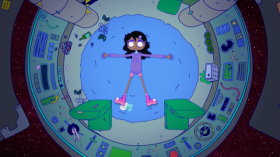
Australian film projects and filmmakers head to market at Cannes
Five Australian screen projects are headed to the Cannes market this May, presented by the Adelaide Film Festival.
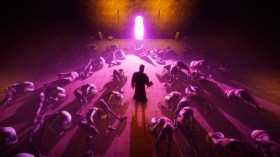
Neo-noir shooter El Paso, Elsewhere is being adapted for film
LaKeith Stanfield is currently in talks to star in the video game adaptation.
Leah J. Williams
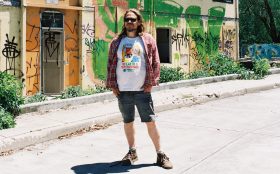
Things Will Be Different: Australian public housing doco to screen in May
The feature documentary will play a limited number of screenings in select cities.
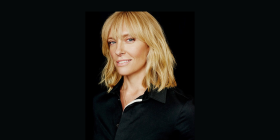
Toni Collette film Under The Stars shooting in Italy
Under The Stars is a new romcom film written by a bestselling YA author.
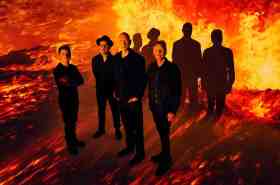
Midnight Oil: The Hardest Line to open Sydney Film Festival 2024
The documentary is the product of seven years following the band, with unseen footage from across their 45-year career.
Paul Dalgarno
Want more content.
Get free newsletters full of the best in Australian screen news, jobs and more delivered to your inbox!

- Creativity in the spotlight at new research centre
- The Lighthouse
- Macquarie Life
- Campus Secrets
Senior Lecturer, Screen Production, Department of Media, Communications, Creative Arts, Language and Literature
People starting out as creatives always face a major hurdle in gaining the industry experience, insights and portfolio they need to help land their first major gig. But a new Macquarie University centre that supports the creative productions of its members and research students is changing that.
The Creative Documentary Research Centre (CDRC) brings together writers, filmmakers, dancers, performance artists and radio producers into a space where students and teachers can engage in real-world creative practice while gaining access to world-class facilities.
“The first thing I say to students on day one is, ‘Welcome to the industry’,” says Dr Karen Pearlman, writer, filmmaker and deputy director at the centre. “This is the first step in building your network, portfolio and career. If you work hard, treat everybody respectfully and learn the skills, then you’ll be able to realise your creative ideas.”
Students receive mentorship
Macquarie University students can undertake industry internships through the CDRC and immerse themselves in real-world documentary-making while they do their degree. Students receive mentorship from the documentary-focused research centre from academic staff and industry expert crews and professional staff.
The first thing I say to students on day one is ‘Welcome to the industry'.
CDRC members currently have five multi-award-winning screen documentaries streaming on public broadcasters, as well as documentary podcasts streaming on ABC Radio National and creative non-fiction books available in bookstores nationally.
“No other university can claim they have this level of industry integration,” says Pearlman, “and the creators of these works are the people students can expect to be taught by at Macquarie.”
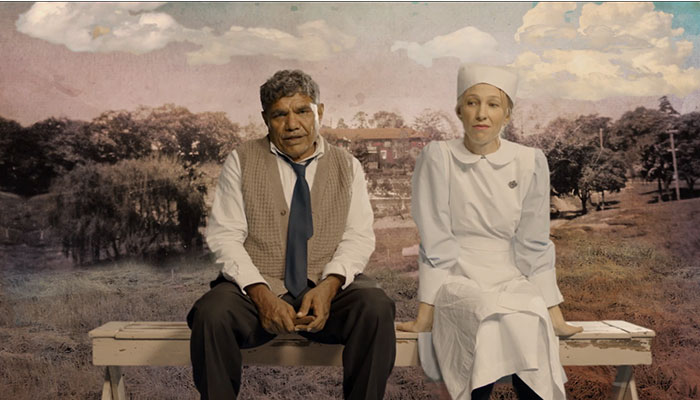
Examples of works now available include This is Our School, The Skin of Others, and I Want To Make a Film About Women, on SBS On Demand, while Ablaze on ABC iview examines the career of Indigenous activist and filmmaker Bill Onus.
Industry-standard facilities
On campus, students, and the teams who are creating screen production projects, have access to the largest film studio of any tertiary institution in the southern hemisphere, equipped with the latest lighting, sound and camera equipment.
- 10 things that wowed me: A parent's perspective
- Bushland treasures on the doorstep
Audio documentary makers and radio/podcasting students work from its on-campus radio station 2SER with audio equipment for live broadcast, audio productions and podcasts.
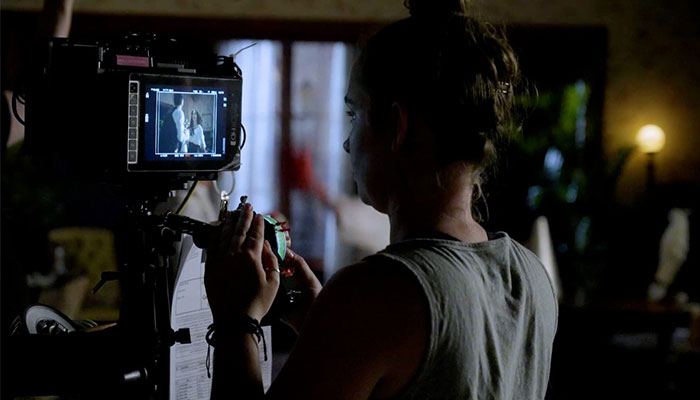
For performance, the Creative Arts at Macquarie has a drama theatre with a Black Box space, as well as a dance studio with a sprung floor and wrap-around screen to incorporate visual elements into a production.
A cross-disciplinary collaboration
In addition to working on the productions of lecturers and postgraduate students, undergraduates who are enrolled in a creative arts or media unit will also get the chance to create their own productions from concept to finished product in film, audio, performance or writing.
“We emphasise that creative practice is a form of research. It must be rigorous and generate new knowledge,” Pearlman says. "Your work should be wonderful to watch and filled with the excitement and energy of discovering new knowledge through creative means.”
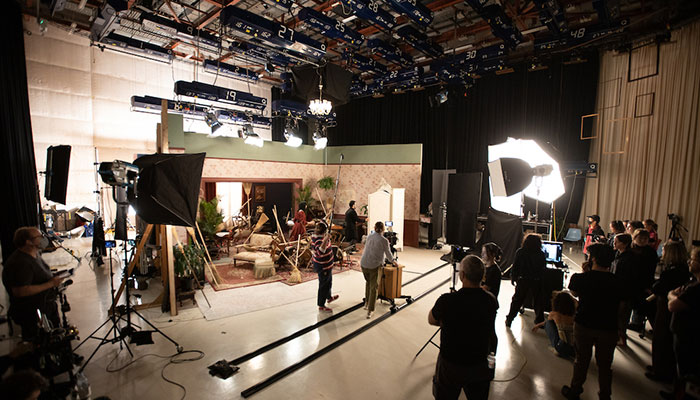
Documentaries draw on university resources
Centre deputy director Bronwen Neil, Professor in the Department of History and Archaeology, explains how CDRC researchers often draw on historical objects, documents, film and audio footage that bring the past to life and these can reveal exciting insights.
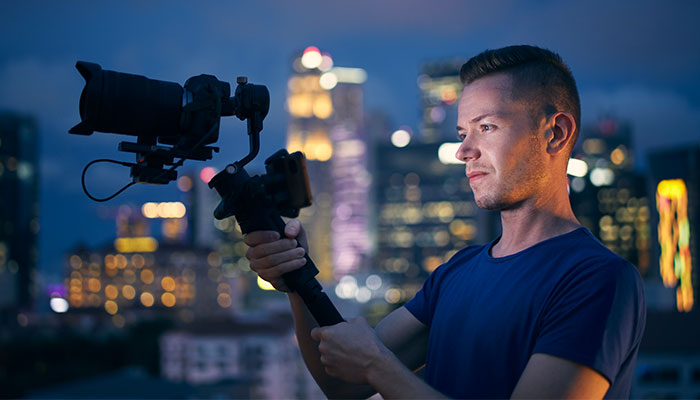
Associate Professor Tom Murray, the Centre’s director and a film producer, director and screenwriter, says the CDRC environment empowers students to experiment with new ways of storytelling. This is particularly poignant, he says, when federal and state government funders have neglected the arts for more than a decade.
“With the CDRC, we want to provide an intellectual and creative environment that encourages deep, reflective, poetic and innovative work that can extend the national discourse, and develop creative scholars and creative arts-makers for the future,” Murray says.
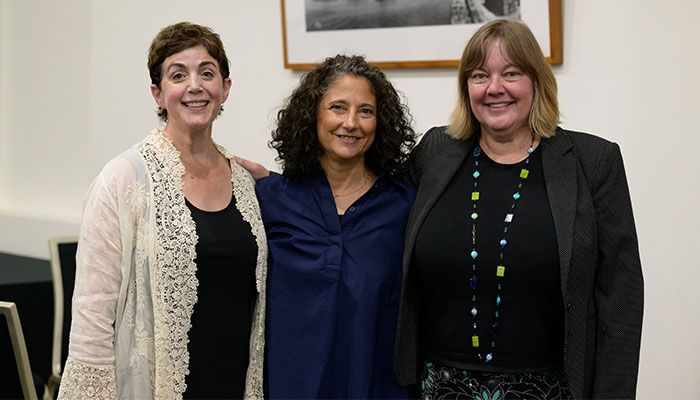
“They can explore how documentary writing forms – such as narrative non-fiction, memoir, essay, poetry, ethnography and reportage – can uniquely capture new knowledge,” she says.
Dr Karen Pearlman is an Associate Professor in Screen Practice and Production, Department of Media, Communications, Creative Arts, Language and Literature, Macquarie University. Dr Pearlman is also a director of The Physical TV Company.
Professor Tom Murray is an ARC Future Fellow, in the Department of Media, Communications, Creative Arts, Language and Literature, Macquarie University.
Associate Professor Kate Rossmanith , ARC Future Fellow, is in the Department of Media, Communications, Creative Arts, Language and Literature, Macquarie University.
Professor Bronwen Neil is a Professor in the Department of History and Archaeology, Macquarie University.
Recommended Reading

- Things to do
CDRC23: Conversations and Connections Documentary Festival
- Share on Facebook
- Share on Twitter
- Copy this link
Every day, 10am to 8:30pm Tuesday 28 November 2023 to Friday 1 December 2023
1-day festival pass - Student : $15 1-day festival pass - General admission : $30 2-day festival pass - Student : $30 2-day festival pass - General admission : $60 4-day festival pass - Student : $45 4-day festival pass - General admission : $90
The Creative Documentary Research Centre (CDRC) invites you to explore the power of today’s creative documentary forms with doco-makers, industry professionals, academics and interested members of the public as part of a four-day festival at the State Library of NSW from 28 November to 1 December 2023.
From an array of film screenings, interactive workshops and panel discussions, there’s something for everyone. Consider challenging contemporary ideas by joining sessions focusing on documenting Australian natural history during times of climate crisis, Indigenous narrative practices, documenting families and communities, the emergence of cutting-edge technologies such as deep fake and virtual reality and the art of documentary practice.
Visit the CDRC23: Conversations and Connections Documentary Festival webpage for the full program or register here .
Contact event organiser
The Creative Documentary Research Centre (CDRC)
Are we missing something?
Advertisement
Other events at State Library of NSW
Action film & war, charles rodius, incredibilia – magical theatre, winning histories – sydney writers' festival, best friends, lauren groff: the vaster wilds, literary legends.
Discover the best events that Sydney has to offer

Creative Documentary by Practice MFA
London, Stratford (UCL East)
A 21-month practice-based programme that provides all the technical and intellectual resources required to make outstanding non-fiction film work. This programme is ideal for students with prior filmmaking experience, who want to develop their craft, and deepen their artistic practice.
UK tuition fees (2024/25)
Overseas tuition fees (2024/25), programme starts, applications accepted.
Applications open
- Entry requirements
A minimum of a lower second-class Bachelor's degree from a UK university or an overseas qualification of an equivalent standard, or a pass at a non practice based Masters. We require an example of your film work to support all applications. We will accept applications from practitioners whose portfolio of work and CV demonstrates communicative and artistic achievement to the level of BA.
We would like to see a portfolio of your film work. This could be single film work or multiple shorter films - but no showreels. Each film should include your role in the credits. Please also submit a short text about a film project you would like to make with illustrative images or photos.
You can submit the film project proposal by attaching a PDF in your application. You can submit your film work by including a link to an external site of your choice at the end of your personal statement).
The English language level for this programme is: Level 4
UCL Pre-Master's and Pre-sessional English courses are for international students who are aiming to study for a postgraduate degree at UCL. The courses will develop your academic English and academic skills required to succeed at postgraduate level.
Further information can be found on our English language requirements page.
Equivalent qualifications
Country-specific information, including details of when UCL representatives are visiting your part of the world, can be obtained from the International Students website .
International applicants can find out the equivalent qualification for their country by selecting from the list below. Please note that the equivalency will correspond to the broad UK degree classification stated on this page (e.g. upper second-class). Where a specific overall percentage is required in the UK qualification, the international equivalency will be higher than that stated below. Please contact Graduate Admissions should you require further advice.
About this degree
The MFA offers students the opportunity to develop non-fiction filmmaking as a creative research practice – making films which interrogate and explore the contemporary world. Drawing on broad based anthropological thought about the social and cultural world we aim to produce filmmakers who are imaginative, risk-taking and intellectually engaged: pushing boundaries in the field. In the first year of the program, each student will make three short films, supported by weekly workshops, tutorials, seminars and screenings. In the second year of the program, each student will devise a graduation film project exploring a subject of their choice, supervised by an industry mentor.
Who this course is for
What this course will give you.
We live in an increasingly audio-visual world. In the 19th century the novel was the form. Today it is moving image. If you want to show people new ways of looking at the world, if you want to use cameras, microphones, the possibilities of montage, to find new ways of representing the lived world, this degree is for you. We have no ideology and promote no house-style. We want to help you find your own voice in an artistic form that is in its earliest days - where 'anything goes'. If that sounds like your home then this degree is for you.
Over two years you will learn to: i) handle cameras and sound recording equipment to produce non-fiction image and sound as well as mastering the technical skills to use professional editing programme/s and post production processes; ii) you will be able to experiment with different forms of moving image, with work of different lengths for varied audiences, learning to take risks; iii) under the highest quality supervision, you'll manage a large moving image project (up to 90 minutes of film) carried out independently; iv) you'll devise a short collaborative visual research project with persons not trained in moving image.
UCL Public Anthropology is an integral part of the creative environment of the 21st century in which the university provides a space for creative work that can only rarely take place outside of its walls. Our studios are therefore a site of creative and collaborative creation, linking the creative industries and university life. Since 2008, and together with Open City Documentary Festival, we have explored how the teaching of creative non-fiction story telling can best be taught. We have pioneered practice-based teaching by practising (part-time) professional film makers.
This programme is based at our brand new UCL East campus in East London, forming part of the School for Creative and Cultural Industries. Students will benefit from cultural and educational connections with our East Bank partners such as the V&A and BBC, as well as state-of-the-art facilities including exhibition, performance and curating spaces, conservation studios and a 160-seater surround-sound cinema.
The foundation of your career
The programme equips students for careers in:
- academia, ethnographic research, visual media and culture
- marketing and research
- communication and other media
- archives, as well as cultural heritage organisations
- film and TV industry as camera operators, producers, directors, editors, researchers
Employability
Graduates of the programme will develop a series of practical and transferable skills including:
- Solving complex problems - developing lateral thinking and creative questioning
- Managing time and production flows in complex projects and effectively integrating research into film practice
- Communicating effectively and succinctly
- Being able to pitch and sell stories/product to potential funders
- Being able to find the moving image form best suited for a particular field of investigation
The MFA will allow you to benefit from UCL's unique position in London, at the centre of the UK creative industries. The programme uses professional filmmakers to teach within a truly pan-disciplinary university research environment. In addition to the tutors at UCL, students will also regularly meet external industry professionals in the masterclasses and workshops which run throughout the course - exposing students to the top-level cinematographers, sound designers, and editors working in cinema today. The yearly MFA Showcase invites key industry players from film festivals and funding bodies to watch the best works produced by students on the program. UCL houses London's global non-fiction film festival, Open City Documentary Festival. MFA students will gain access to this festival, providing a unique opportunity to engage with the global creative non-fiction industry.
Teaching and learning
This practice-based programme is delivered through seminars, masterclasses, practical workshops and tutorials followed by supervised project work. Across the MFA you will spend significant time completing camera and editing exercises, building up a portfolio of work as well as watching numerous films.
All work is assessed, either formatively or formally, by the MFA teaching team.
In the first term you will spend two days a week in tutorials and in the second and third terms one day a week. You will have additional masterclasses and screenings most weeks in the first year. You will spend at least two days a week across the whole year in self-directed film making. In the second year you will have tutorials one day a week in the first term and then critical reviews across the period completing your graduation project.
The compulsory modules typically involve around 360 contact hours (a mix of 2h & 3h seminars, 1 hr tutorials). Optional modules (15 credit) usually amount to 54 contact hours (assuming 2h weekly seminar) but will vary depending on the choice of modules.
In the first year, students complete four compulsory modules: ANTH0176 ‘Introduction to the Practice of Creative Documentary Film’ ANTH0177 ‘Advanced Practice of Creative Documentary Film’ ANTH0178 ‘Collaborative Film’ ANTH0179 ‘Research Work and Research Book’ The first term opens with a series of exercises designed to reframe our students’ approach to documentary filmmaking. These formal exercises build towards the culmination of ANTH0176 – a short film and accompanying written text delivered by the end of the first term. The second and third
term of Year 1 focus on a longer work for ANTH0177, followed by the research and development work (ANTH0179) for the Graduation Film (ANTH0180). During the first year, students will also take the compulsory module: Collaborative Film (ANTH0178) – in which they work with a researcher to collaboratively devise a film piece. The collaborator can be an academic, a research team, or any other practitioner in another field who is willing to engage with the student on a shared film project. In the second year, students will independently make their graduation film project: a creative documentary film/moving image project on a subject of their choosing. They will begin work on this project towards the end of the first year, keeping work in a Research Book. Production begins in the second year supervised by the module tutors and project mentors. Students will also produce a written text reflecting on their process. Alongside these compulsory modules, students will also take optional modules offered by the documentary film programme within Anthropology, including film history courses and others designed to develop story-telling capabilities; film history modules from the Film Studies suite and other options from across UCL – where possible – and where relevant to the research for their final film
Compulsory modules
Optional modules.
Please note that the list of modules given here is indicative. This information is published a long time in advance of enrolment and module content and availability are subject to change. Modules that are in use for the current academic year are linked for further information. Where no link is present, further information is not yet available.
Students undertake modules to the value of 300 credits. Upon successful completion of 300 credits, you will be awarded an MFA in Creative Documentary by Practice.
There is no formal fieldwork but almost all film projects will involve working off-site.
Accessibility
Details of the accessibility of UCL buildings can be obtained from AccessAble accessable.co.uk . Further information can also be obtained from the UCL Student Support and Wellbeing team .
Fees and funding
Fees for this course.
This is a 2-year programme, comprising 300 credits in total. The full-time fee quoted is for Year 1 only; the fee in Year 2 will be subject to UCL's fee increases of up to 5% annually.
The tuition fees shown are for the year indicated above. Fees for subsequent years may increase or otherwise vary. Where the programme is offered on a flexible/modular basis, fees are charged pro-rata to the appropriate full-time Master's fee taken in an academic session. Further information on fee status, fee increases and the fee schedule can be viewed on the UCL Students website: ucl.ac.uk/students/fees .
Additional costs
All full-time students are required to pay a fee deposit of £2,000 for this programme. All part-time students are required to pay a fee deposit of £1,000.
You will need to have two hard drives capable of securely storing your film material. UCL provides one of these in exchange for you buying your own private licence of Creative Cloud for home use. UCL runs Creative Cloud on the edit computers so there is no need for a personal licence but some students find this useful.
Students are expected to complete their coursework on campus, as the computers on site are equipped to support video editing.
For more information on additional costs for prospective students please go to our estimated cost of essential expenditure at Accommodation and living costs .
Funding your studies
For a comprehensive list of the funding opportunities available at UCL, including funding relevant to your nationality, please visit the Scholarships and Funding website .
Aziz Foundation Scholarships in Social and Historical Sciences
Value: Full tuition fees (equivalent to 1yr full-time) (1yr) Criteria Based on financial need Eligibility: UK
UCL East London Scholarship
Deadline: 20 June 2024 Value: Tuition fees plus £15,700 stipend () Criteria Based on financial need Eligibility: UK
There is an application processing fee for this programme of £90 for online applications and £115 for paper applications. Further information can be found at Application fees .
When we assess your application we would like to learn:
- why you want to study Creative Documentary by Practice at graduate level
- why you want to study Creative Documentary by Practice at UCL
- what particularly attracts you to this programme · how your personal, academic and professional background meets the demands of a challenging programme
- where you would like to go professionally with your degree.
We would also like to see a portfolio of your work - with a film/s of up to 20 minutes duration that you have shot and edited yourself. Please provide a short text (max 500 words) about the film, reflecting on your intentions and the process.
Together with essential academic requirements, the personal statement is your opportunity to illustrate whether your reasons for applying to this programme match what the programme will deliver. This program is targeted at students who already have made film work, but now wish to push themselves creatively. We expect students to arrive with an understanding of how to shoot and how to edit, with a good working knowledge of Adobe Premiere Pro.
Please note that you may submit applications for a maximum of two graduate programmes (or one application for the Law LLM) in any application cycle.
Choose your programme
Please read the Application Guidance before proceeding with your application.
Year of entry: 2024-2025
Got questions get in touch.

Anthropology
UCL is regulated by the Office for Students .
Prospective Students Graduate
- Graduate degrees
- Taught degrees
- Taught Degrees
- Applying for Graduate Taught Study at UCL
- Research degrees
- Research Degrees
- Funded Research Opportunities
- Doctoral School
- Funded Doctoral Training Programmes
- Applying for Graduate Research Study at UCL
- Teacher training
- Teacher Training
- Early Years PGCE programmes
- Primary PGCE programmes
- Secondary PGCE programmes
- Further Education PGCE programme
- How to apply
- The IOE approach
- Teacher training in the heart of London
- Why choose UCL?
- Entrepreneurship
- Inspiring facilities and resources
- Careers and employability
- Your global alumni community
- Your wellbeing
- Postgraduate Students' Association
- Your life in London
- Accommodation
- Funding your Master's
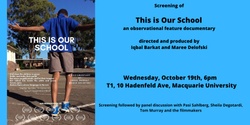
Screening of This Is Our School Documentary & Panel Discussion
Event description.
MACQUARIE UNIVERSITY SCHOOL OF EDUCATION and CREATIVE DOCUMENTARY RESEARCH CENTRE present
a screening of This is Our School, an observational feature documentary directed and produced by Iqbal Barkat and Maree Delofski.
The film will be presented by A/Prof Tom Murray, Director, Creative Documentary Research Centre, Macquarie University
This is Our School is set in Merrylands East Public School in Western Sydney and is one of the few films documenting life in a primary school. It's a year-long, intimate and loving study of a primary school in one of Sydney’s most diverse suburbs. At its heart is an exploration of how a school community comes together to gracefully and ethically educate children and prepare them for the contemporary world despite facing huge challenges. It’s a celebration of public education in Australia.
This is Our School had its world premiere at the Melbourne Documentary Festival and its US premiere at the Newburyport Documentary Festival. It has been invited to more than twelve international film festivals.
Watch the trailer here: https://www.thisisourschoolfilm.org
The screening will be followed by a panel discussion and Q&A with Pasi Sahlberg, Professor of Education @ Southern Cross University and internationally-renowned advocate of public education; Prof Sheila Degotardi, Interim Dean, School of Education @ Macquarie University and the filmmakers.
We would love to see you at the screening. Please help us spread the word.
Parking available in the Yellow West 4 Zone (directly across 10 Hadenfeld Ave) and the Green West 3 Zones.
Tickets for good, not greed Humanitix donates 100% of profits from booking fees to charity

Refund policy
No refund policy specified.
- Help & FAQ

View Scopus Profile
Karen Pearlman
Associate Professor
- Associate Professor , Department of Media, Communications, Creative Arts, Language and Literature
- Performance and Expertise Research Centre
- Phone +61 2 9850 2176
Research activity per year
Personal profile
Dr Karen Pearlman writes, directs and edits screen productions. She researches creative practice, cognition and feminist film histories. She is a deputy director of the Creative Documentary Research Centre with a portfolio in Creative Practice and Screen Culture.
Karen Pearlman ’s trilogy of short films about historical women editors (2016, 2018 & 2020) have won 34 highly competitive national and international awards from peak industry bodies and film festivals, including 3 for best editing, 3 for best directing and 6 for best documentary. Her 2020 film, ‘ I want to make a film about women’ , was longlisted for an Oscar and shortlisted for an Australian Academy Award. The special jury prize citation from the Sebastopol Documentary Film Festival reads: "a film of innovative brilliance, celebrating the inexhaustible, essential tenacity of suppressed artists everywhere".
Karen is a former President of the Australian Screen Editors Guild and enjoys her ongoing association with the guild as a full member, consultant, and public speaker. A 5-time Best Editing Award nominee, Karen is a leading theorist, speaker and writer on the art of film editing, she is the author of Cutting Rhythms, Intuitive Film Editing (now in its 2nd edition with Focal Press), with translations into Chinese, Korean, Turkish and Arabic. Her ideas about editing are also well-known around the world through her YouTube series The Science of Editing created with This Guy Edits .
Karen is a an Associate Professor in Screen Production and Practice at Macquarie University, the 2020 Australian Top Research Institution in Film. She and her colleague Dr Iqbal Barkat won the Australian Award for University Teaching Citation for their collaborative teaching of screen production in 2019, and Karen supervises and mentors higher degree research students in screen culture and creative practice.
Before joining Macquarie, Karen held the post of Head of Screen Studies at AFTRS for 6 years and was a partner investigator in the ARC/Australia Council funded investgation Games and the Wider Interactive Entertainment Industry in Australia: an inquiry into sources of Innovation, a project focussed on identifying transferable skills of arts practitioners that could be productive in the games industry. She came to that project from a distinguished career as a professional dancer - performing with the Bill T. Jones/Arnie Zane Company on the Opera House stages of the world and directing two dance companies. She holds a Doctorate of Creative Arts from UTS, two MAs - one from UTS and one from AFTRS, and a BFA in dance from NYU Tisch School of the Arts.
Research student supervision
Principal Supervisor
Kersti Grunditz-Brennan (Phd, Completed 2023, Stockholm University of the Arts)
Beyond Cut and Join: Expanding the creative role of film editing
Emma Watkins (MRes completed 2018, PhD completed 2024)
Creative sign language, dance, and film editing - a series of tests in formal integration
Emmeline Dulhunty (MRes 2020 completed, PhD current)
Cinematic Experience: Film Form and the Phenomenology of Cognition
Jacob Gottlieb (MRes 2022 Completed, PhD current)
Golem in Jerusalem: Creative Practice Inquiry into New-Materialist and Posthumanist Conceptions of Jewish Mysticism
Timothy Sharp (2023 MRes completed)
When the Walls Spoke: Research into Psychogeographical Approaches to Cinema
Desmond Bravo (2023 MRes completed)
Perceptual ghosts: a study in acousmêtre and observational documentary
Michelle Mead (MRes 2020 completed)
Can a superhero fight patriarchy? Challenging the ancient masculinisation of mythic heroism in modern superhero action cinema
Margaret Meehan (MRes 2018 completed)
The Art of Mentoring: examining some practices of media mentorship in multicultural Australia.
Kevin Lucas (MRes 2017 completed)
THE AGE OF THE ABORIGINAL AVATAR: reclaim ing the sacred in a Virtual World
Margaret McHugh (MRes 2017 completed)
POETIC HONESTY – THE ART OF STORYTELLING IN HYBRID DOCUMENTARY
Associate Supervisor
Saba Vasafi (PhD 2021)
Cleo Mees (PhD 2018)
Andrew Sully (PhD 2017)
Education/Academic qualification
Masters in Editing, Australian Film Television and Radio School
Bachelor of Fine Arts, Honours in Dance, New York University, Tisch School of the Arts
Masters in Media Arts and Production, University of Technology Sydney
Doctor of Creative Arts, University of Technology Sydney
External positions
Head of Screen Studies, Australian Film Television and Radio School
1 Mar 2009 → 1 Mar 2014
Fingerprint
- 1 Similar Profiles
- Editing Arts & Humanities 100%
- Distributed Cognition Arts & Humanities 47%
- Editor Arts & Humanities 38%
- Dance Arts & Humanities 37%
- Filmmaking Arts & Humanities 37%
- History of Film Arts & Humanities 33%
- Rhythm Arts & Humanities 29%
- Film Editing Arts & Humanities 28%
Collaborations and top research areas from the last five years
Dive into details.
Select a country/territory to view shared publications and projects
- 1 Not started
Projects per year
Climbing the walls: material culture and bodies in motion
Pearlman, K.
15/02/24 → 31/12/24
Project : Research
MQRIS: Virtual Reality (VR) fieldwork research system
Murray, T. , Pearlman, K. , Barkat, I. , Lloyd, K. , Suchet-Pearson, S. , Evans, T. , Power, R. , Sone, Y. & Knowles, J.
11/04/21 → …
Project : Other
MQRIS: Observational Documentary Fieldwork Kit
Murray, T. , Pearlman, K. , Barkat, I. , Long, J. , Sone, Y. & Burtt, J.
11/04/19 → …
MQRIS: Ultra High Definition Cinema Cameras
Murray, T. , Pearlman, K. & Barkat, I.
15/03/19 → …
MQRIS: High Precision Cinematic Lighting System
14/03/18 → …
Research Outputs
- 7 Digital or Visual products
- 2 Conference proceeding contribution
- 2 Website contribution
- 1 Edited Book/Anthology
- 1 Commissioned report
- 1 Other chapter contribution
- 1 Book/Film/Article/Exhibition review
- 1 Comment/opinion
- 1 Editorial
- 1 Other journal contribution
Research output per year
Creating character in editing
Research output : Contribution to journal › Article › peer-review
- Taxonomies 100%
- Physics 41%
- expertise 35%
- Decision making 34%
Distributed Authorship: an 'et al,' proposal of of creative practice, cognition and feminist film histories
- History of Film 100%
- Authorship 76%
- cognition 67%
- Cognition 63%
- history 44%
Impossible Image
Research output : Non-traditional research output › Digital or Visual products
One long electrical cord: dance, editing, and the creative unfinished
Research output : Chapter in Book/Report/Conference proceeding › Chapter › peer-review
- Editing 95%
- Censorship 53%
- New Media 36%
Peribiophoty
- time experience 100%
- research practice 66%
- paradigm 46%
ATOM Award for Best Docudrama
Pearlman, Karen (Recipient), 10 Dec 2020
ATOM Award for Best Documentary - Biography
- teacher 100%
ATOM Award for Best Short Fiction Film
Pearlman, Karen (Recipient), Dec 2016
- editing 100%
Australian Awards for University Teaching - Citation for Outstanding Contributions to Students Learning
Barkat, Iqbal (Team leader) & Pearlman, Karen (Recipient), 2018
Prize : Teaching award
Australian Directors Guild Award for Best Director of a Short Documentary
Pearlman, Karen (Recipient), 19 Oct 2020
- 18 Invited talk
- 12 Publication Peer-review
- 6 Editorial work
- 6 Examination
- 2 Organising a conference, workshop or event series
- 2 Membership of committee
- 1 Presentation
- 1 Visiting an external non-academic institution
- 1 Visiting an external academic institution
Activities per year
Sebastopol Documentary Film Festival 2022 Short Documentary Prize Jury
Karen Pearlman (Other)
Activity : Other
Investigative Re-Animations
Karen Pearlman (Speaker)
Activity : Talk or presentation › Invited talk
[in]Transition: Journal of Videographic Film & Moving Image Studies (Journal)
Karen Pearlman (Reviewer)
Activity : Peer-review and editorial of research outputs › Editorial work
Filmmaker Interview - Jewish International Film Festival
Enactive media research group (external organisation).
Karen Pearlman (Member)
Activity : Membership › Membership of committee
Press/Media
Cinematic blind spots: giving voice to what was once hidden.
1 item of Media coverage
Press/Media : Other
Research in the 21st Century: legacy forms, ‘new’ media and ERA
Tom Murray , Bronwen Neil , Karen Pearlman & Kate Rossmanith
1 Media contribution
Press/Media : Expert Comment
To Russian women with love: trilogy celebrates forgotten filmmakers
Press/Media : Public Engagement Activities
Why does an edit feel right?
A review of karen pearlman’s woman with an editing bench, after the facts, and i want to make a film about women.
Press/Media : Research
Crediting, royalties and representation for Screen Editors with writing credits
Karen Pearlman (Participant) & Daniela Simone (Participant)
Impact : Commercial impacts, Culture impacts
Karen Pearlman (Participant)
Impact : Culture impacts
Good Editing is Not Invisible
Impact : Culture impacts, Training impacts
Reimagining Design with Nature: ecological urbanism in Moscow
- Reflective Essay
- Published: 10 September 2019
- Volume 1 , pages 233–247, ( 2019 )
Cite this article

- Brian Mark Evans ORCID: orcid.org/0000-0003-1420-1682 1
977 Accesses
2 Citations
Explore all metrics
The twenty-first century is the era when populations of cities will exceed rural communities for the first time in human history. The population growth of cities in many countries, including those in transition from planned to market economies, is putting considerable strain on ecological and natural resources. This paper examines four central issues: (a) the challenges and opportunities presented through working in jurisdictions where there are no official or established methods in place to guide regional, ecological and landscape planning and design; (b) the experience of the author’s practice—Gillespies LLP—in addressing these challenges using techniques and methods inspired by McHarg in Design with Nature in the Russian Federation in the first decade of the twenty-first century; (c) the augmentation of methods derived from Design with Nature in reference to innovations in technology since its publication and the contribution that the art of landscape painters can make to landscape analysis and interpretation; and (d) the application of this experience to the international competition and colloquium for the expansion of Moscow. The text concludes with a comment on how the application of this learning and methodological development to landscape and ecological planning and design was judged to be a central tenant of the winning design. Finally, a concluding section reflects on lessons learned and conclusions drawn.
This is a preview of subscription content, log in via an institution to check access.
Access this article
Price includes VAT (Russian Federation)
Instant access to the full article PDF.
Rent this article via DeepDyve
Institutional subscriptions
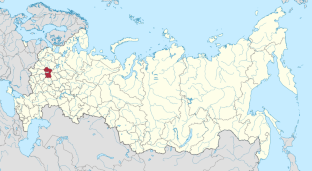
Similar content being viewed by others
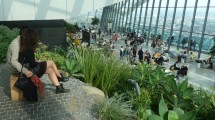
Principles for public space design, planning to do better
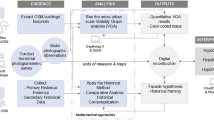
Acknowledgements
The landscape team from Gillespies Glasgow Studio (Steve Nelson, Graeme Pert, Joanne Walker, Rory Wilson and Chris Swan) led by the author and all our collaborators in the Capital Cities Planning Group.
Author information
Authors and affiliations.
Mackintosh School of Architecture, The Glasgow School of Art, 167 Renfrew Street, Glasgow, G3 6BY, UK
Brian Mark Evans
You can also search for this author in PubMed Google Scholar
Corresponding author
Correspondence to Brian Mark Evans .
Rights and permissions
Reprints and permissions
About this article
Evans, B.M. Reimagining Design with Nature: ecological urbanism in Moscow. Socio Ecol Pract Res 1 , 233–247 (2019). https://doi.org/10.1007/s42532-019-00031-5
Download citation
Received : 17 March 2019
Accepted : 13 August 2019
Published : 10 September 2019
Issue Date : October 2019
DOI : https://doi.org/10.1007/s42532-019-00031-5
Share this article
Anyone you share the following link with will be able to read this content:
Sorry, a shareable link is not currently available for this article.
Provided by the Springer Nature SharedIt content-sharing initiative
- Design With Nature
- Find a journal
- Publish with us
- Track your research

Apr. 24, 2024
Moody fellow to graduate with distinction in creative works, rice senior ayla davis used fellowship to complete documentary about sister’s hearing loss.
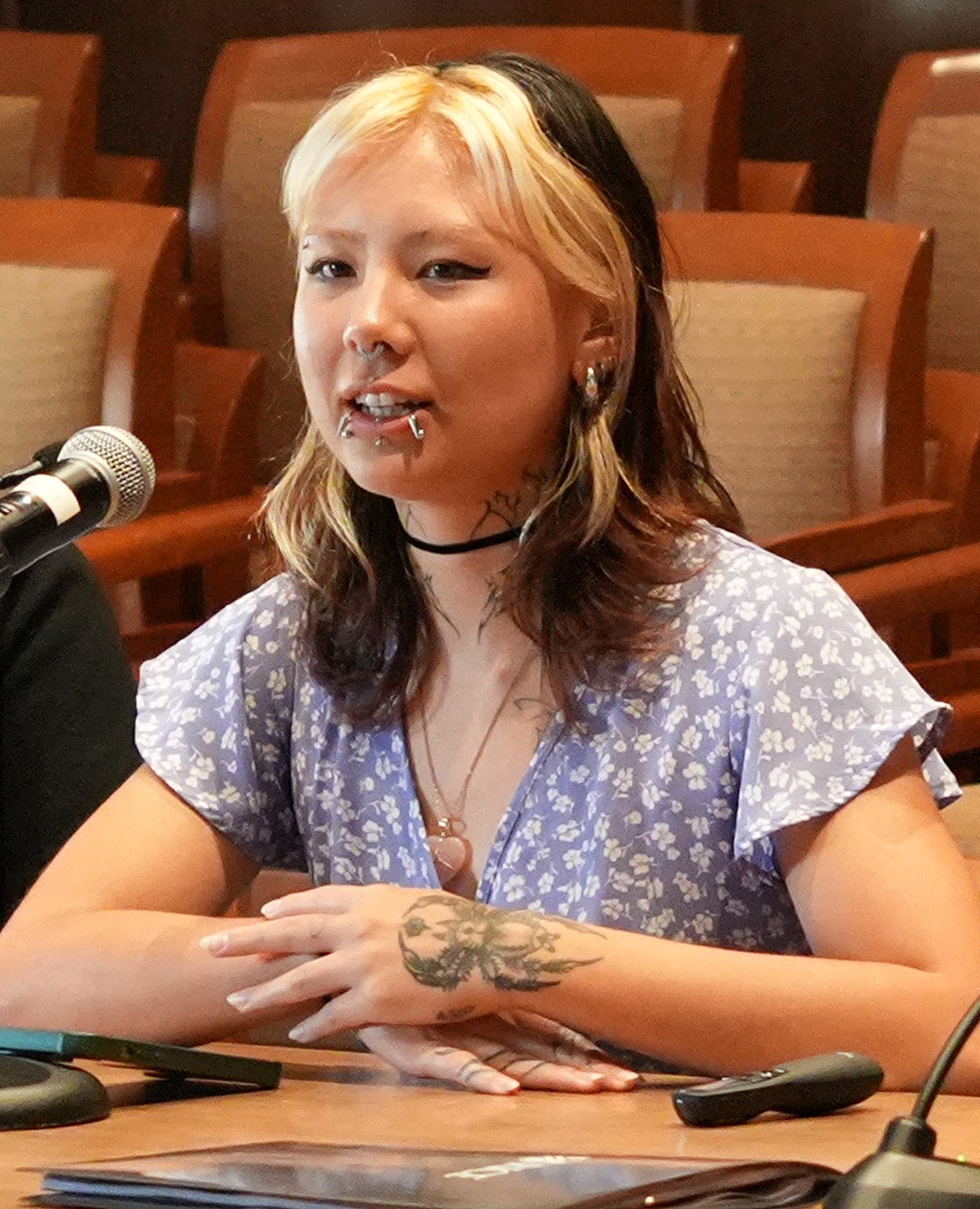
The exchange is a personal one, captured on camera by Rice senior Ayla Davis, who is interviewing Nathania Davis-Fox about her hearing loss.
“How do you feel about that?” Davis asks after Davis-Fox shares that the condition may eventually result in total hearing loss.
“Scared. Anxious,” Davis-Fox tells Davis. “A little hopeless. Kind of desperate.”
The conversation is part of Davis’ documentary, “ The Idea of Never ,” which spotlights her older sister’s challenges living with a hearing disability.
“She discussed how her hearing loss can sometimes be difficult in social situations and at work because people don’t realize that she’s hearing impaired,” Davis said. “It’s been really interesting for me to get to know more about her experience and her relationship with everyone around her.”
For the past 10 months, Davis has been making the drive from Houston to Fort Worth where her sister lives to film interviews and document Davis-Fox’s life.
“She’s lost about half of her hearing so far, and she’s only 24 years old,” David said, adding that Davis-Fox is married and attending law school at Texas A&M University. “What I’m trying to get at in my documentary is figuring out what it’s like to live with this hearing disability and how can I make her life easier?”
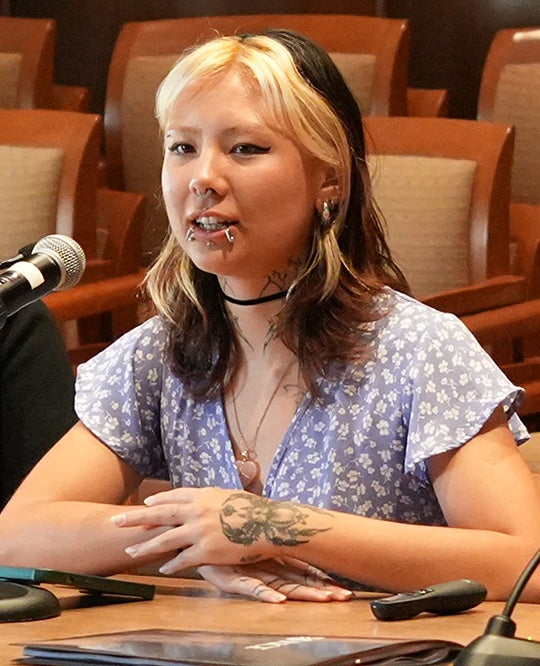
“The glory of the filmmaking is the fact that the process of making has served to bring the lives of both sisters closer together,” said art professor Brian Huberman , who has taught Davis throughout her Rice career. “She started during the challenging COVID days when classes were online, and she was a thumbnail on my monitor.”
Davis is, in Huberman’s words, “a jewel in the filmmaking community.”
“A lot of students try the film experience but move on when they discover the stamina and discipline that is required to work in this medium,” Huberman said. “Ayla demonstrates with her documentary that she has the right stuff.”
A recipient of the Elizabeth Lee Moody Undergraduate Research Fellowship in the Humanities and the Arts , Davis was provided $3,500 in funding to work on the research project of her choice with the expectation that she invest at least 200 hours in it. The fellowship’s goal is to create a vibrant undergraduate community at Rice focused on advancing critical and innovative scholarly and creative endeavors in the humanities and arts. By allowing students to select their own project, the program fosters diverse forms of humanities-driven exploration and innovation, encompassing everything from traditional text-based research to creative and curatorial projects.
“I thought it was great because it was so open-ended,” Davis said, explaining why she decided to apply for the fellowship. “You truly pursue or research whatever you’re interested in. I saw it as an opportunity to work on a film.”
She also tapped into experiences within the Department of Art to produce, shoot, write and edit the documentary, most recently in assistant art professor Sindhu Thirumalaisamy ’s film studio class.
“She’s been watching my cuts of it and giving me feedback,” Davis said. “She’s honestly one of the best professors that I’ve ever had, but it is a very hard class.”
Davis also attributes her success at Rice to mentors Huberman and Charles Dove , professor in the practice of film and director of Rice Cinema.
“She is the living embodiment of what we hope for our majors within the art department,” Dove said.
Dove listed off Davis’ accomplishments, which include planning events and the annual festival of films as an intern for the Houston Cinema Arts Society , programming and introducing a series of Robert Frank’s experimental films as the William Camfield Fellow for the Museum of Fine Arts, Houston and working as projectionist for Rice Cinema .
“She combines the filmmaking side of working in the arts with the exhibition side,” Dove said. “She has an understanding of the ways in which films circulate through museums and universities that can help her moving forward in her life. She has the kind of personality and poise that are necessary for that work.”
For that reason, Davis received one of the art department’s senior awards April 18, which is also when Davis learned she will graduate with a distinction in creative works.
“The film program is what you make of it,” Davis said. “All the most valuable things that I’ve learned have been from meeting people. You can learn so much just from talking to other artists. So everyone should do that. All the time.”
RICE week highlights College commitment to student research, creative endeavors
April 23, 2024
by Matt Overing
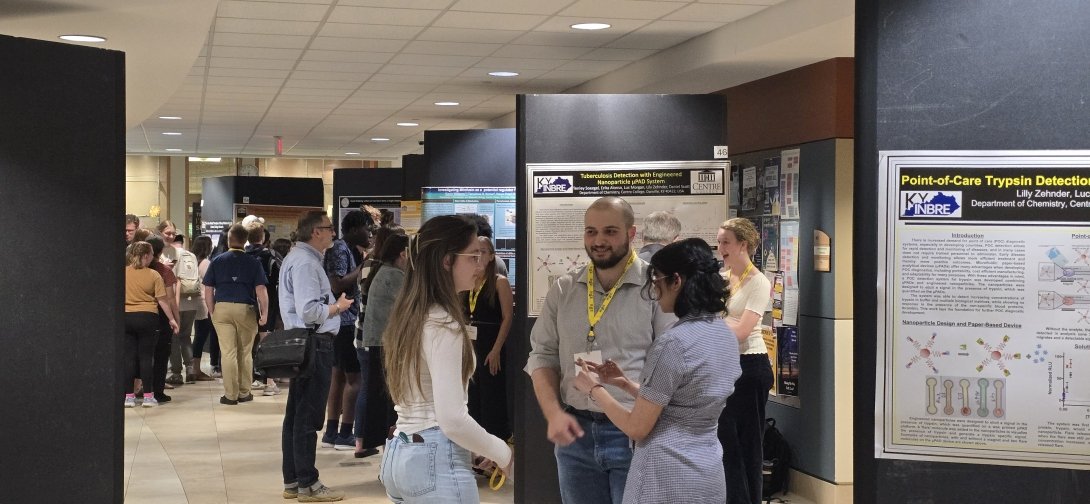
Centre College students took to the stage — in classrooms and hallways and galleries — to share an academic year’s worth of research, internship experiences and creative endeavors (RICE).
RICE week is the celebration of student achievement, massive in scale with more than 150 students taking part, and it’s a unique-to-Centre approach that helps students gain experience presenting their work — a skill that will serve them well in post-graduate and career settings.
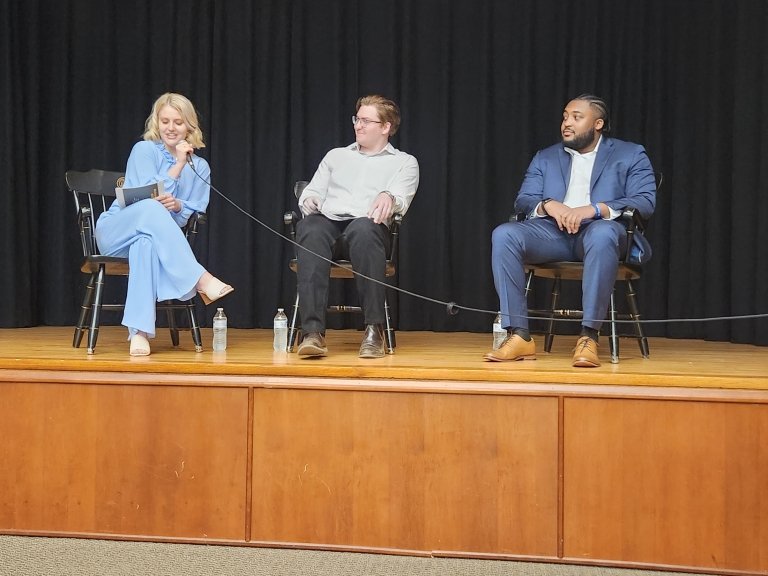
Students heard from successful alumni Vivian Bowles ‘21, River Fuchs ‘21 and William Britt ’21, who shared their undergraduate research experience and the impact it had on their career during the RICE Symposium lecture.
“I am always impressed by the breadth and depth of the work presented at RICE,” said RICE chair Karoline Manny, instruction and reference librarian. “The research featured at RICE comes from all disciplines.”
Students in Associate Professor of Psychology and Behavioral Neuroscience Aaron Godlaski’s class shared their findings on how caring for plants affects mental health. Class of 2024 members Niki Maleki, Ali-Grace Fleeman, John Beebe and Gray Rahbany shared their findings that caring for plants did boost the mood of students.
“We wanted to look at something that we could relate to as college students, like stress,” Rahbany said.
Four students in Professor of Psychology Jan Wertz’ class presented the beginnings of a research question on the relationship between belongingness and mental health in college students. Seniors Duerell Bard, Will Kempf, Ella Treinen, and Braden Duncan, class of 2025, presented their research with the goal of finding solutions to belonging on campus.
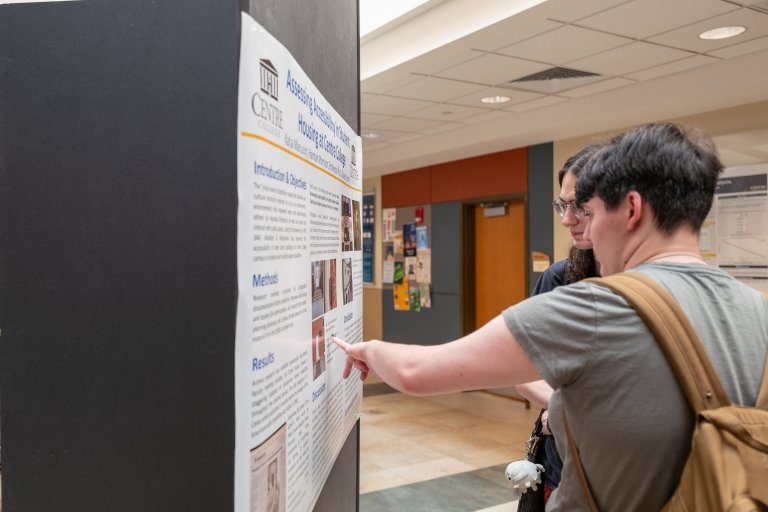
“We found studies being done at larger schools, and we are curious to see how we can use this data at Centre,” Treinen said. “We have such a unique environment and a close-knit community — how can that be different and how can we use what we find to benefit our campus?”
Oral presentations ranged from Taylor Swift to molecular dynamics simulations. Students in the J. H. Atkins Scholars Program presented on diversity, inclusion, equity and social justice topics.
"RICE is an amazing time to engage with my peers," Rahbany said. "Being able to show them the work that my group and I have been working on over the past year is something that only the Centre experience brings."
RICE week culminated with the symposium Thursday, with students across disciplines sharing their work. Additionally, the AEGON Gallery at the Jones Visual Arts Center played host to 40 different art students sharing sculptures, blown glass, pictures, paintings and more, from intro to drawing course work to upper level work in drawing and painting, glass, ceramics and photography.
“It is such a joy to have the opportunity to see the final product of all the hard work I see the students producing, and I always plan to take full advantage of the day to watch as many presentations as possible,” Manny said.
Photo at top couresy Francisco Lacson, class of 2025
You may also like
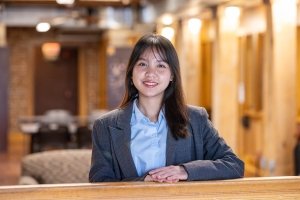
Centre student awarded third consecutive PPIA Summer Institute scholarship
Centre College is preparing its students for prestigious fellowships across the globe — see what one Lincoln Scholar is doing to make the most of her experience.
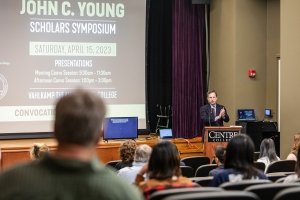
'From students to scholars’: John C. Young research program prepares students for postgraduate opportunities
Centre College’s premier research challenge is nearing its summit. The John C. Young program at Centre is a prestigious challenge for high-achieving seniors looking to tackle a project in their final...
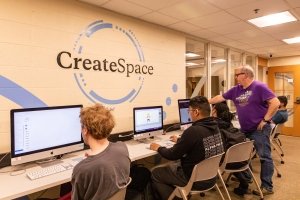
Ideas blaze to life with CreateSpace
Centre College’s Grace Doherty Library is offering a new resource to spur the campus community’s creativity using the latest design tools available. The new CreateSpace is a lab where students...
Take the Next Step
- External Review
- Annual Report
- Vision, Mission, Values and Statements
- Dialogues Newsletter
- Events Newsletter
- Edubytes Newsletter
- Academic Program Design and Renewal
- Educational Evaluation and Research
- Learning Design
- Professional Development
- Technologies
- All Our Programs
- Open to Everyone
- Faculty Programs
- Graduate Student & TA Programs
- Staff Programs
- Indigenous Initiatives
- Communities of Practice

Intersecting biases of language and race
By janice ho on April 25, 2024
In the April edition of Edubytes , our guest editors are Assistant Professor Meghan Corella and Professor Ryuko Kubota from the UBC Faculty of Education. They introduce animation videos, created by their team, based on a published article for the purpose of raising viewers’ awareness of intersectional injustices involving race and language.
Antiracism has become a core initiative at UBC. Based on the Final Report from the President Task Force on Anti-Racism and Inclusive Excellence (2022), the Strategic Equity and Anti-racism (StEAR) Framework was launched to prepare for the implementation of the recommendations. In 2024, the UBC Equity & Inclusion Office released the StEAR Roadmap for Change (PDF) , which integrates UBC’s various existing plans for advancing equity, diversity, and inclusion. It specifies objectives to be achieved over the next five years.
In promoting anti-racism and intersectional justices, however, what is often overlooked is linguistic injustices experienced by multilingual people, many of whom are racialized. To address the hidden ideology of what’s often called raciolinguistic injustices, a team of scholars in the UBC Department of Language and Literacy Education created Your English is So Good , two short animated videos featuring fictitious graduate students having casual conversations about the racial and linguistic biases that they have experienced. The conversation scripts were developed by drawing on an interview study that we conducted and using the methodology of research-based theater.
These videos show how racialized multilingual students encounter and contest normative and oppressive assumptions about language use, personal names, and communication styles that are entangled with the ways their racialized identities are perceived by others.
The videos can be used in multiple contexts, including classrooms, workshops, and orientations, by anyone at UBC and beyond. We hope that they will invite viewers to increase their awareness of how race and language intersect with each other in perpetuating implicit ideologies that shape everyday dehumanizing experiences, and yet have a potential for advancing our anti-racist agenda in a more robust way.
The scripts for the videos are also available on the website for those who are interested in using them in the form of Reader’s Theatre.
Additional resources
Kubota, r., corella, m., lim, k., & sah, p. (2023). “your english is so good”: lives of racialized students and instructors of a canadian university. ethnicities , 23(5), 758–778..
This study focuses on linguistic dimensions of racialized graduate students’ everyday experiences of racism and racialization in a Canadian university, analyzing the assumptions others routinely make about their names, language use, and communication styles. The study concretely illustrates some of the many manifestations of biases related to language and race and emphasizes the importance of valorizing not only racialized students’ stories, but also their ways of telling their stories.
Read the study
World Englishes : Voices in Canada
Focused on the global diversity of English used by diverse English speakers in Vancouver, a team of language educators in the UBC Department of Language and Literacy Education produced this documentary film containing five thematic episodes. The fourth episode features interviewees’ experiences and perspectives about the entanglement of English and race, inviting viewers to examine the interrelationships among language, race, and ideologies.
Watch the full documentary
The Tyee – Winning the Right to Teach in BC Meant Battling Racism, Say Two Candidates
This 2020 article provides accounts of IBPOC teacher candidates’ experiences with raciolinguistic injustices in teacher education programs and schools in British Columbia. It illustrates the intersecting biases of language and race that are especially important for teachers, teacher educators, and school administrators to be aware of and challenge.
Read the article
Ghanem, R., & Kang, O. (2021). Nonnative students’ expectations and linguistic stereotyping of English teachers in an ESL context. ELT Journal , 75(3), 330–340.
This empirical study conducted in the United States demonstrates how English-as-a-second-language students were affected by “reverse linguistic stereotyping,” in which the visual portrayal of a speaker influences listeners’ comprehension of the speech and perceived effectiveness of the speaker. The second author, Okim Kang, is a prominent scholar on this topic. She is interviewed in the show, Talk American (2018), on the National Public Radio (starting at 19:45).
Enjoyed reading about intersecting biases of language and race? Learn about other topics we covered in the April 2024 edition by reading the complete Edubytes newsletter. To view past issues, visit the Edubytes archive .
Are you interested in staying up to date on the latest trends in teaching and learning in higher education? Sign up for our newsletter and get this content delivered to your inbox once a month.
Posted in Edubytes , Feature Slider Tagged with

- Bahasa Indonesia
- Slovenščina
- Science & Tech
- Russian Kitchen
Russia set to build new space center in Moscow (PHOTOS)
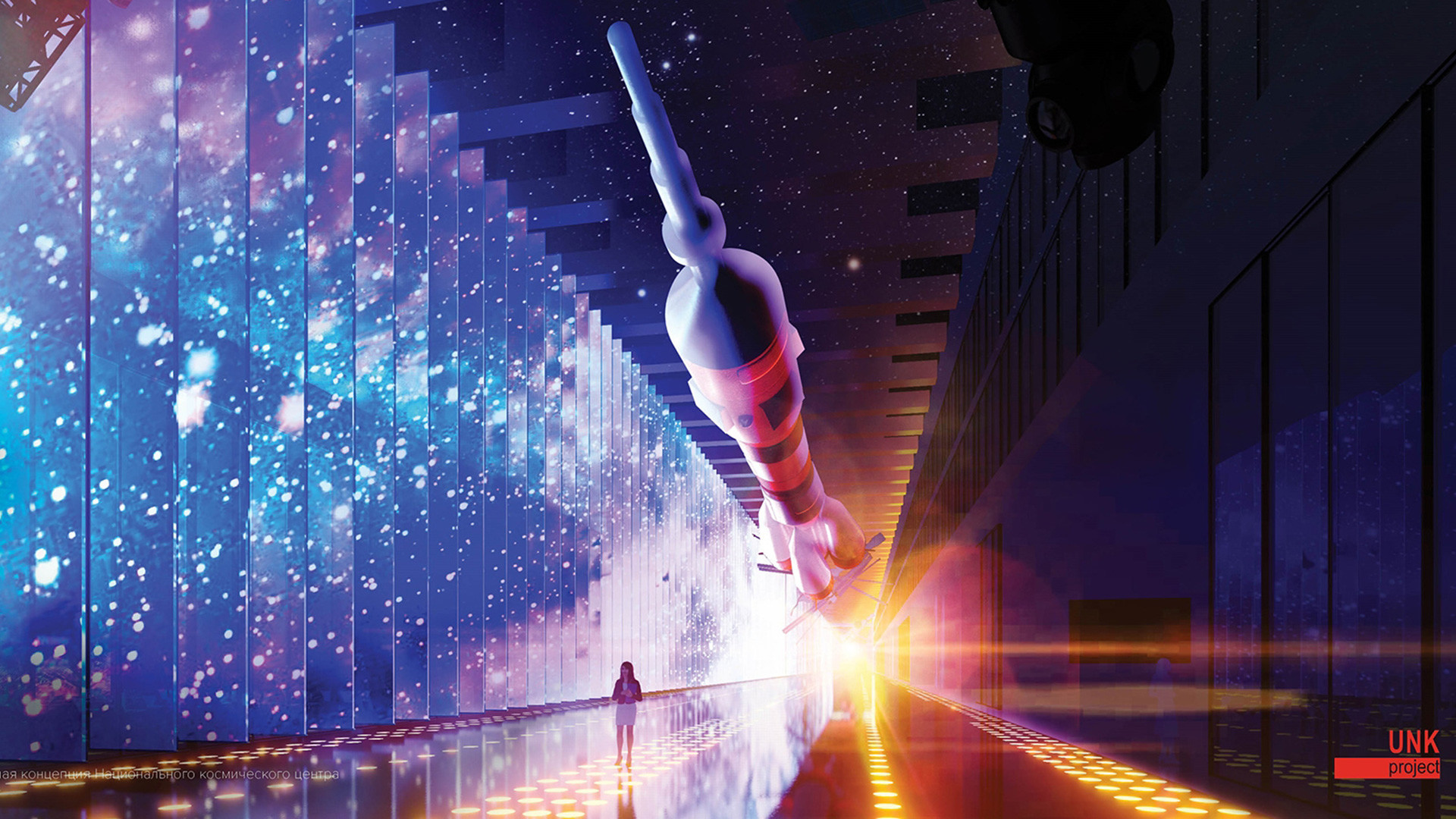
Russia’s new National Space Center is being constructed on the site of the Khrunichev State Space Research and Production Center in western Moscow.
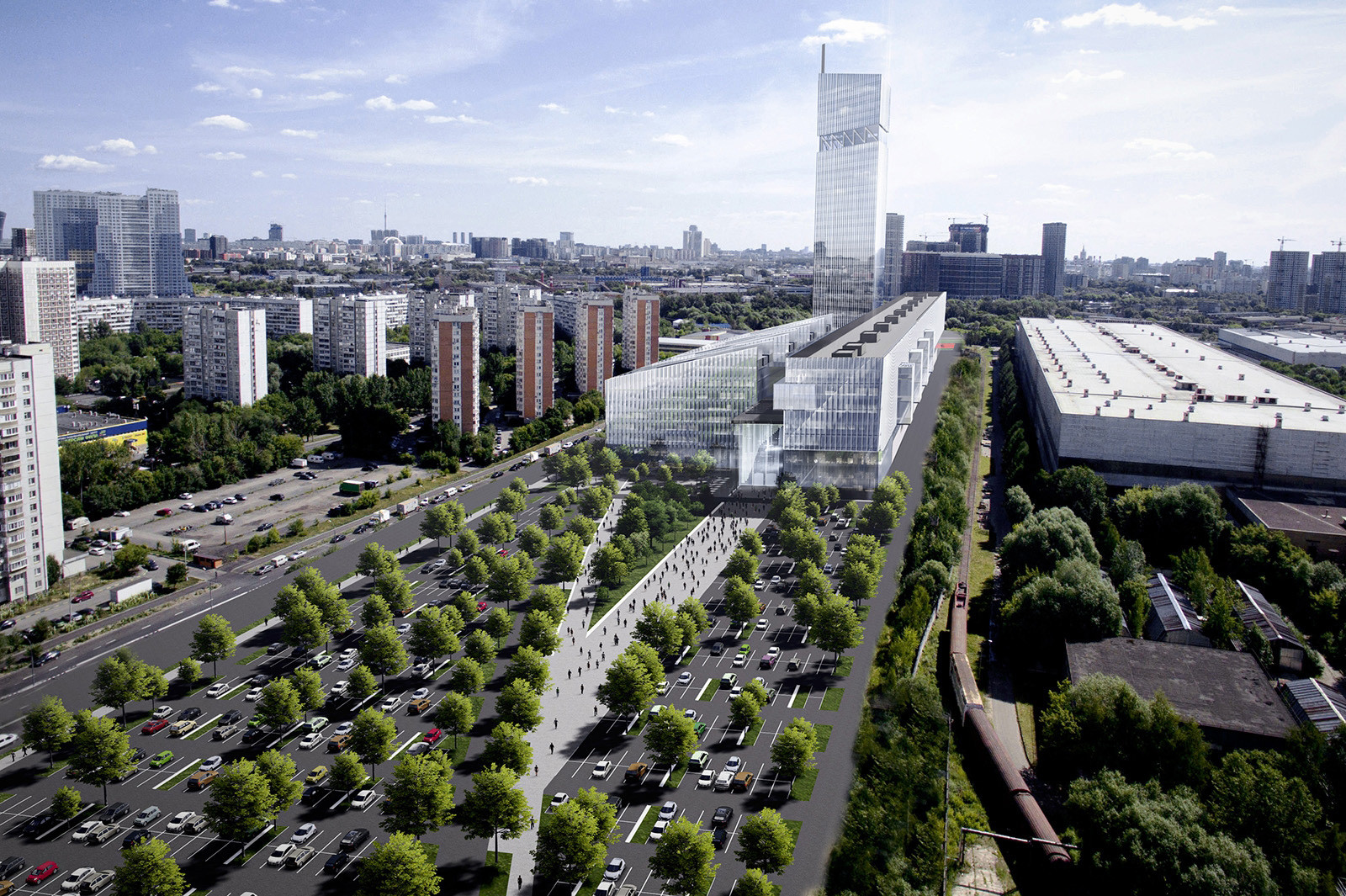
On June 21, the Moscow City Architecture Committee approved the urban planning solution, according to the official website of the Moscow Mayor’s Office.

The tender to develop the architectural concept, announced in October 2019, was won by the Russian design bureau UNK Project.
According to their concept, the main component of the center will be a triangular tower in the form of a 248m-tall rocket, which will house the headquarters of Roscosmos. The facade of the building will be illuminated to create a moving-up effect. And at the base, lighting fixtures will simulate the flame of a rocket booster.

Adjoining the tower will be a long building with research labs and offices. This building will be traversed by a 545m-long central gallery, along which canteens and consumer services will be located.

In addition, the complex will feature open-air museums in U-shaped courtyards, where pieces of aerospace equipment will be suspended in the air via cables between the buildings.

The ceremonial laying of the first stone took place in September 2019, and construction is scheduled to finish by 2022.

If using any of Russia Beyond's content, partly or in full, always provide an active hyperlink to the original material.
to our newsletter!
Get the week's best stories straight to your inbox
- The evolution of Russia’s spacesuit - from Gagarin to now (PHOTOS)
- These ancient Soviet planes are still flying (PHOTOS)
- Top 7 Russian electric cars (PHOTOS)
This website uses cookies. Click here to find out more.

IMAGES
VIDEO
COMMENTS
The CDRC supports the creative productions of its members and research students across all documentary media: screen, audio, photography, digital media, fiction and nonfiction writing, and poetry. It aggregates a community of practice, hosts events such as symposia, screenings conferences and workshops, and provides collegiality, mentorship and ...
28 November - 1 December, 2023. Location: State Library of New South Wales Be inspired when Macquarie University's Creative Documentary Research Centre (CDRC) brings together doco-makers and industry professionals, academics and the public to explore the power of today's creative documentary forms.. Held over four days from Tuesday 28 November to Friday 1 December, at the State Library ...
As a direct response to this, Macquarie University last year launched the Creative Documentary Research Centre (CDRC) within the Faculty of Arts, which intends to support the creative productions of its members and students across all documentary media (screen, audio, photography, digital media and forms of writing).
Tom Murray is founding and current director of the Creative Documentary Research Centre at Macquarie University. He has worked in documentary production for over 25 years as a writer, director, and producer, and his work has been selected in some of the world's most prestigious international film festivals, and won high accolades in the film, television, radio, and audio industries.
Creative arts in the 21st Century, and the role of the newly launched Creative Documentary Research Centre (CDRC) at Macquarie University. Period: 10 Nov 2022: Media contributions 1. Media contributions. Title: Meet Tom Murray of the Creative Documentary Research Centre: Degree of recognition: National: Media name/outlet:
The Creative Documentary Research Centre (CDRC) brings together writers, filmmakers, dancers, performance artists and radio producers into a space where students and teachers can engage in real-world creative practice while gaining access to world-class facilities.
Creative Documentary Research Centre, Faculty of Arts, Macquarie University.
The Creative Documentary Research Centre's mission is to generate and communicate knowledge, insight, perspectives, and understandings that can only be secured through creatively practiced documentary forms. The CDRC supports the creative productions of its members and research students across all documentary media: screen, audio, photography ...
He is Founding Director of the Creative Documentary Research Centre. Kate Rossmanith. Kate Rossmanith is a nonfiction writer and an Associate Professor at Macquarie University, Australia. She researches narrative and emotion in legal processes, as well as creative nonfiction forms. In 2021 she was awarded an Australian Research Council Future ...
The Creative Documentary Research Centre (CDRC) invites you to explore the power of today's creative documentary forms with doco-makers, industry professionals, academics and interested members of the public as part of a four-day festival at the State Library of NSW from 28 November to 1 December 2023.
In the first year, students complete four compulsory modules: ANTH0176 'Introduction to the Practice of Creative Documentary Film' ANTH0177 'Advanced Practice of Creative Documentary Film' ANTH0178 'Collaborative Film' ANTH0179 'Research Work and Research Book' The first term opens with a series of exercises designed to reframe ...
MACQUARIE UNIVERSITY SCHOOL OF EDUCATION and CREATIVE DOCUMENTARY RESEARCH CENTRE present. a screening of This is Our School, an observational feature documentary directed and produced by Iqbal Barkat and Maree Delofski. The film will be presented by A/Prof Tom Murray, Director, Creative Documentary Research Centre, Macquarie University
Kersti Grunditz Brennan is currently assistant professor of film editing and PhD-candidate in film & media at Stockholm University of the Arts. She has explored film form in documentary and fiction live action, short and long formats, narrative cinema, archival based stories, essays and experimental hybrids for the past 20 years; for cinema, other art contexts, through research and education.
That documentary was followed by a two-part film on the Russian prison system whose sources included Oleg Navalny (the brother of opposition leader Alexey), renowned prisoners' rights advocate Olga Romanova, and Pussy Riot member Maria Alyokhina. ... Lena Samoilova, the YouTube producer for a creative agency called Zebra Hour, said the ...
She is a deputy director of the Creative Documentary Research Centre with a portfolio in Creative Practice and Screen Culture. Karen Pearlman 's trilogy of short films about historical women editors (2016, 2018 & 2020) have won 34 highly competitive national and international awards from peak industry bodies and film festivals, including 3 ...
In 2003, a UK landscape studio was offered the opportunity to become involved in the design of a new settlement in the Moscow Region to carry out landscape planning and design (Figs. 1, 2a, b—Moscow in context). Gillespies LLP is a long-established practice of landscape architects, urban designers and environmental planners established in Glasgow, UK, in 1962 (Gillespies web link 2019).
For many years, the leading designers defining visual communications in Moscow and beyond have been graduates of the British Higher School of Design, based at the Artplay centre. The centre is also home to the Moscow Film School, the MARCH School of Architecture, and the computer graphics college Scream School, whose former students have played an important role in the rising standard of ...
"Ayla demonstrates with her documentary that she has the right stuff." A recipient of the Elizabeth Lee Moody Undergraduate Research Fellowship in the Humanities and the Arts, Davis was provided $3,500 in funding to work on the research project of her choice with the expectation that she invest at least 200 hours in it. The fellowship's ...
Research. Centre College students took to the stage — in classrooms and hallways and galleries — to share an academic year's worth of research, internship experiences and creative endeavors (RICE). RICE week is the celebration of student achievement, massive in scale with more than 130 students taking part, and it's a unique-to-Centre ...
It illustrates the intersecting biases of language and race that are especially important for teachers, teacher educators, and school administrators to be aware of and challenge. Read the article. Ghanem, R., & Kang, O. (2021). Nonnative students' expectations and linguistic stereotyping of English teachers in an ESL context.
Russia's new National Space Center is being constructed on the site of the Khrunichev State Space Research and Production Center in western Moscow. On June 21, the Moscow City Architecture ...
The Centre for Research on Globalization will not be responsible for any inaccurate or incorrect statement in this article. The Centre of Research on Globalization grants permission to cross-post Global Research articles on community internet sites as long the source and copyright are acknowledged together with a hyperlink to the original ...